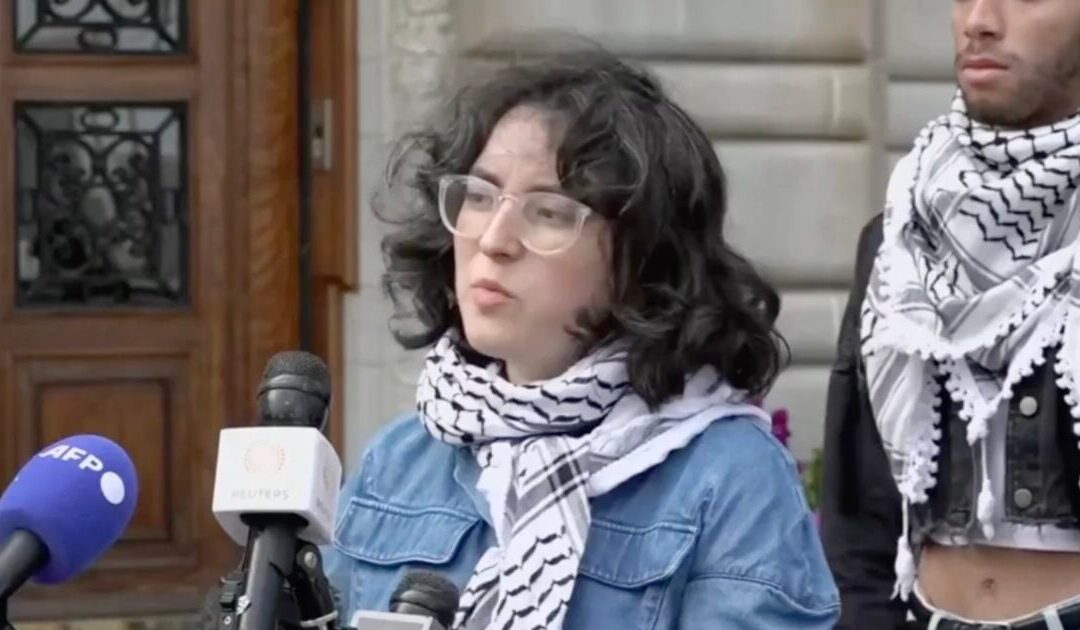Screenshot: Johannah King-Slutzky, a paid instructor & PhD candidate at Columbia
A Columbia University protest leader was caught in a cycle of contradictions when reporters questioned the logic behind the protestors’ demands for food and water after they had unlawfully taken over Hamilton Hall.
The protest escalated dramatically overnight, with the group smashing windows and forcefully entering the building. The Hamas supporters fortified their position by barricading doors and covering windows, effectively taking control of the academic building.
The occupation began around half past midnight following a standoff on the university’s academic lawn, where protesters had set up roughly 120 tents. The move to storm Hamilton Hall, a central location used by university deans, came shortly after the university administration took action to suspend those refusing to dismantle their encampment.
A Columbia facilities worker recounted the harrowing experience of being held against his will by the protesters. “They held me hostage,” the worker disclosed to the Columbia Spectator after being released.
The protesters have laid out clear demands: for Columbia University to divest from Israel, increase transparency regarding their financial affiliations, and grant amnesty to all students involved in the prolonged demonstrations, Fox News reported.
Protestors are now demanding that the university provide them with food and water, essential supplies they were cut off from due to their own barricades. They argue that their basic needs should be met despite their aggressive actions.
A reporter challenged the protest leader, asking why the university should cater to the needs of those who unlawfully occupied its property.
“Why should the university be obligated to provide food to people who’ve taken over a building?” the reporter asked.
The leader’s response was a mix of entitlement and confusion, first asserting an obligation due to paid meal plans, then scrambling to clarify the nature of their requests for “basic humanitarian aid.”
The conversation became increasingly muddled as the reporter pointed out the self-inflicted nature of the situation, with the protest leader contradicting earlier statements by saying they were not asking for direct provision but rather non-interference with outside aid – a commitment they sought from the university.
Protest Leader: “Well, first of all, we’re saying that they’re obligated to provide food to students who pay for a meal plan here.”
Reporter: “But you mentioned that there was a request that food and water be brought in.”
Protest Leader: “Unless I misunderstood. To allow it to be brought in. I guess it’s ultimately a question of what community and obligation Columbia feels it has to its students. Do you want students to die of dehydration and starvation or get severely ill, even if they disagree with you? If the answer is no, then you should allow basic… I mean, it’s crazy to say because we’re on an Ivy League campus, but this is basic humanitarian aid we’re asking for. Could people please have a glass of water?”
Reporter: “Don’t they have water? But they did put themselves in that very deliberately in that situation and in that position. So it seems like you’re saying, ‘We want to be revolutionaries. We want to take up this building. Now, would you please bring us food and water?’”
Protest Leader: “Nobody’s asking them to bring anything. We’re asking them to not violently stop us from bringing in basic humanitarian aid.”
As the dialogue continued, the leader’s position became less clear, with them admitting uncertainty over whether attempts to deliver food had been made or prevented, revealing cracks in the protesters’ front.
Second reporter: They’re stopping the delivery of food?
Protest Leader: We are looking for a commitment from them that they will not stop it.
Second reporter: But they haven’t stopped it yet?
Protest Leader: Well… I don’t… I am not… I don’t know to what extent it has been attempted, but we’re looking for a commitment.
Investigative reporter Jordan Schachtel was able to identify the Pro-Hamas spokesperson.
“I did a quick search and found that this lady, who refused to reveal her name, is named Johannah King-Slutzky. She is a paid instructor & PhD candidate at Columbia studying “theories of the imagination & poetry as interpreted through a Marxian lens.” No, I’m not making this up,” Schachtel wrote on X.
WATCH:
UNREAL: Columbia protest leader demands administration bring food to rioters who broke into Hamilton Hall
“Do you want students to die of dehydration and starvation?”
REPORTER: “It seems like you’re saying, ‘we want to be revolutionaries, we want to take over this building, now… pic.twitter.com/KTdEpL0rVM
— Breaking911 (@Breaking911) April 30, 2024
The post ‘You Guys Put Yourself in That Position’: Columbia Protest Leader Struggles for Words as Reporters Expose Hypocrisy for Demanding University to Feed Protesters Who Occupied Hamilton Hall (VIDEO) appeared first on The Gateway Pundit.

